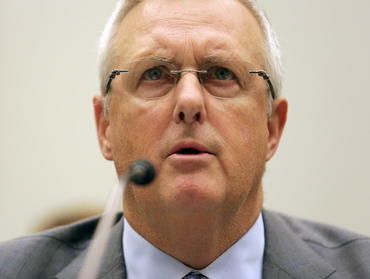
Apple general counsel Bruce Sewell. (Image: file photo)
Apple’s chief lawyer has fired back at the Justice Dept. for its latest attempt to “smear the other side with false accusations and innuendo.”
Bruce Sewell, the company’s general counsel, was responding to the latest filing by the Justice Dept., which filed its latest brief with the court challenging the company’s refusal to help the FBI unlock an iPhone used by the San Bernardino shooter.
Among other things in the government’s 34-page court filing, prosecutors argued that Apple “deliberately raised technological barriers” that Apple “alone can remove” so that it can bring suspected criminals to justice.
But on a call with the media earlier on Thursday, Sewell said the government’s latest filing “reads like an indictment,” and includes accusations that “cheapens the debate and it tries to mask the real and serious issues.”
Sewell reiterated that the company had tried to help the government prior to its initial February 17 motion, which demanded that Apple create custom-build software for the terrorist’s iPhone in order to bypass the security measures, allowing federal agents to guess the device’s passcode without being locked out after failed attempts.
“We work shoulder to shoulder with [the FBI] all the time,” said Sewell. “That’s why this cheap shot brief surprises us so much.”
“I can only conclude that the [Justice Dept.] is so desperate at this point that it’s thrown all decorum to the winds,” said Sewell.
The government’s filing comes a little over a week after Sewell and FBI director James Comey, were called to testify at the House Judiciary Committee. Despite the occasional heated tone and sharp rhetoric, the two opposing witnesses both agreed that Congress should legislate on the matter.
Sewell said on the call that he thought things were moving in a positive direction, calling Comey’s testimony was measured and responsible. But he said that he was “surprised” at some of the allegations in the filing.
Apple branded some of the specific allegations as “ridiculous,” referring to where the Justice Dept. said in its filing that Apple “made special accommodations in China.”
The filing said among other things that Apple is “presumably sharing confidential information with the Chinese government.”
Attorneys for Apple — who were also on the call — quickly rebuffed the allegation, saying that some of the Justice Dept.’s arguments are like “throwing pasta on a wall and hoping something sticks.”
The company said that it had “categorically and absolutely not” been asked or compelled by any country — including Russia and China — to build a backdoor to its systems, but the only place this demand has been made was in the US.
Executives indicated that ahead of March 15, the deadline for the company to file its response, the company would submit additional filings challenging the Justice Dept.’s claims. Sewell said that the back-and-forth was all so Apple can exercise its legal rights to protect its customers from hackers and criminals.
“It seems like disagreeing with the Justice Dept. means you must be evil and anti-American,” he said. “Nothing could be further from the truth.”
Apple will next appear in court in California on March 22, a day after an expected product announcement in California.


